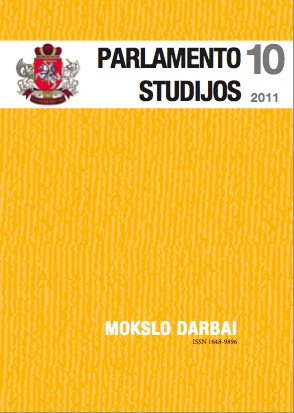Financing of Parliamentary Activity as a Form of Indirect State Funding of Political Parties
DOI:
https://doi.org/10.51740/ps.vi10.306Keywords:
funding of political parties, indirect state funding of political parties, financing of parliamentary activity, parliamentarian, member of the Seimas of the Republic of Lithuania, assistant–secretary of member of the Seimas, parliamentary faction, leader of the Seimas opposition, expenditure for parliamentary activity, privileges, financial accountabilityAbstract
The article discusses common and national aspects of financing of parliamentary activity in the context of funding of political parties, specifically – indirect state funding of political parties. While analysing this question the attention is paid both to legal and political dimensions, moreover, examples of the most striking cases identified by the author and the mass media are presented. With the intention to illustrate the amount of funds for financing of parliamentary activity or another factual maintenance for parliamentarians and parliamentary factions which can be absorbed by the political parties they are presenting, in this article such elements of financing of parliamentary activity subinstitute as an accountability duty or the potential of assistants–secretaries of members of the Seimas to became an integrate part of partisan apparatus are examined separately.
The article begins with the description of the conception of indirect state funding of political parties. The first part of it is dedicated to emphasize the main features of financing of parliamentary activity, including the most important one – it is not a part of classical legal regulation concerning funding of political parties. As shows the second part the situation in Lithuania is the same as well. Though it should be noticed that the only one explicit constitutional provision related to funding of political parties is a provision which states inter alia material guarantees of member of the Seimas. The third part is aimed to illustrate that a duty of financial accountability of members of the Seimas is not satisfactory, because the information revealed to the society is summarised and not sufficient to do any significant conclusions. The parliamentary factions in Lithuania are even in better position – they do not have such an obligation at all. In this part of the article the examples of misuse of financial resources for financing of parliamentary activity are introduced. The last part of the article, i. e. the fourth part analyzes the most important factual maintenance for members of the Seimas – a guarantee of providing them with the personnel of assistanst–secretaries. It should be mentioned that the so called cabinet of member of the Seimas at the same time often works for the political party this member of the Seimas is representing. In this way the partisan bureaucracy is developing.








 The metadata of the scholarly journals and publications of the Lithuanian National Martynas Mažvydas Library is distributed by
The metadata of the scholarly journals and publications of the Lithuanian National Martynas Mažvydas Library is distributed by 